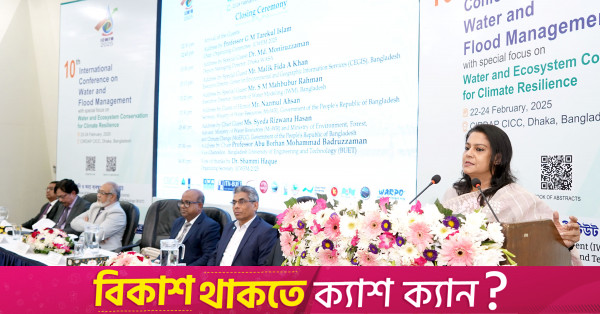The move is expected to will bolster the country’s legal standing in international water negotiations.
The adviser speaking at an international seminar on water and flood management on 24 Feb at CIRDAP. Photo: Courtesy
“>

The adviser speaking at an international seminar on water and flood management on 24 Feb at CIRDAP. Photo: Courtesy
Bangladesh is in the final stages of ratifying the European Convention on Shared Lakes and Rivers, a move that will bolster the country’s legal standing in international water negotiations, Water Resources Adviser Syeda Rizwana Hasan said today (28 February).
Speaking at an international seminar on water and flood management at CIRDAP, with a focus on water and ecosystem conservation in the context of climate change, the adviser underscored the urgent need to safeguard Bangladesh’s rivers and communities.
Expressing optimism about ongoing efforts, she highlighted discussions with international and bilateral development partners and noted the Asian Development Bank’s (ADB) keen interest in supporting the rehabilitation of the Buriganga River.
Rizwana, also adviser to the Ministry of Environment, Forest and Climate Change, said, “Restoring our rivers is a formidable challenge, yet it is not beyond our reach. It must begin today.”
She drew attention to the persistent gap between policy formulation and implementation, stating that the real challenge lies in the lack of commitment to enforcement.
“Dhaka, despite being surrounded by seven rivers, faces a severe water crisis. People expect overnight solutions—clean air today, restored rivers tomorrow. But we must acknowledge that years of ecosystem neglect and destruction cannot be reversed instantly,” she said.
The adviser warned that Bangladesh’s river systems are losing their natural flow due to over-extraction for agriculture, fisheries, and industrial use.
“Rivers that once met the sea are now running dry. They have been reduced to drainage channels for industrial waste. This must change if we are to protect our water security and biodiversity,” she said.
Addressing transboundary water-sharing challenges, she stressed the need for strategic national preparedness.
On flood management, she highlighted Bangladesh’s alarming ranking in climate vulnerability indices.
“We must prioritise investments in river navigability, flood protection, and community preparedness. Our early warning systems need to be more effective, and communication with vulnerable populations must be in languages they understand,” she said.
She cautioned against normalising excessive flooding and called for targeted budget allocations to safeguard agriculture, fisheries, river transport, and water supply.
“Our people are resilient, but resilience alone is not enough. The global community must take responsibility for protecting major river systems and sharing real-time data to mitigate flood risks.”
As climate change accelerates, the adviser advocated for a proactive and preventive approach. “Adaptation has its limits. If global mitigation targets are not met, how much can we truly adapt? Climate change is not just our battle—it is a shared global responsibility.”
The seminar was chaired by Professor Abu Borhan Mohammad Badruzzaman, Vice Chancellor of Bangladesh University of Engineering and Technology (BUET). Distinguished speakers included Nazmul Ahsan, Secretary, Ministry of Water Resources; SM Mahbubur Rahman, Executive Director, Institute of Water Modeling (IWM); Malik Fida A Khan, Executive Director, Center for Environmental and Geographic Information Services (CEGIS); Special Guest Dr. Md. Moniruzzaman, Deputy Managing Director, Dhaka WASA; and Professor GM Tarekul Islam, Chair of the Organizing Committee, ICWFM 2025.


